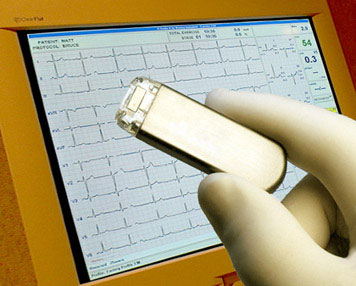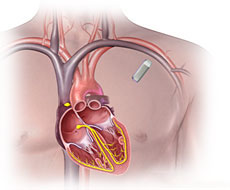Implantable Heart Monitor

Implantable heart monitor, also know as loop recorder, records heart’s electrical activity. Your doctor can use the information recorded by this heart monitor to determine if the cause of your symptoms may be related to an abnormal heart rhythm. Once your doctor has this information, he/she can decide which treatment option is most effective for you.
This heart monitor is used to determine causes of infrequent fainting or other unexplained symptoms such as dizziness and/or palpitations. Other heart monitors that hook-up outside the body can record ECG signals for 30 or 60 days. However, loop recorder is designed for long-term use. It can be used for up to 14 months, so it increases the chance of capturing your heart signal during infrequently occurring episodes.
What happens after the loop recorder stores an ECG during an episode?
After an episode, an appointment should be scheduled with your doctor to read and clear the saved recordings. If a heart rhythm-related cause is found, your doctor will recommend therapy based on the exact cause. The treatment may include medication, a pacemaker, an implantable defibrillator, or another heart rhythm-related treatment. If your heart rhythm can be ruled out as a cause, your doctor can focus on other potential causes of your symptoms.
How long will I have a loop recorder?
Your doctor will determine how long the loop recorder is used. Typically after one or more ECG recordings are made, your doctor will determine if your symptoms are related to an abnormal heart rhythm. At that time, the heart monitor can be removed in a quick and simple procedure.

How does a loop recorder work?
Once the loop recorder is implanted in your upper chest area, it is programmed to continuously monitor your heart’s activity in the form of an electrocardiogram (ECG). When an episode occurs, a patient (or family member) immediately places a small hand-held activator over the loop recorder area and presses a button. This records the heart’s signal before, during, and after the episode. A loop recorder can also record abnormal heart rhythms automatically if programmed to do so by your doctor.
The Procedure
How is the insertable loop recorder implanted?
Implanting the insertable loop recorder takes about 15 to 20 minutes and can be done under a local anesthetic. The physician makes an incision about 2 cm. in length (3/4 of an inch), creating a pocket the same size and shape as the insertable loop recorder device. Once the device is inserted in the pocket, it is programmed to record the ECG during a fainting episode. No overnight hospital stay is required.
When heart activity is recorded during an actual fainting spell, and the physician is satisfied that heart rhythm-related causes can be ruled in or out, the device is removed.
Is the procedure painful?
The implant procedure is relatively painless. Local anesthesia is used and the incision created is quite small - about 2 cm. (3/4 of an inch) in length.
What are the risks
Risks associated with the insertable loop recorder implantation surgery are minor and rare. They include but are not limited to infection at the implant site and reactions to local anesthesia. These are risks common to all forms of minor surgery.
Will implant affect my physical appearance?
The implant is visible as a slightly elevated area on the skin at the implant site.
How long will I have to have insertable loop recorder?
Generally, the insertable loop recorder will remain in place until it records an episode of syncope to the physician's satisfaction, that is, until the physician can rule in or rule out an abnormal heart rhythm based on data from the Insertable Loop Recorder. The battery life of the Insertable Loop Recorder is about 14 months. If a satisfactory diagnosis has still not been made after 14 months, the physician will decide what to do next.
Acknowledgements
Heart Rhythm Specialists of South Florida gives special thanks to the National Library of Medicine, Medtronic and National Heart Lung and Blood Institute whose Web sites aided in the research of the patient educational material provided above.






